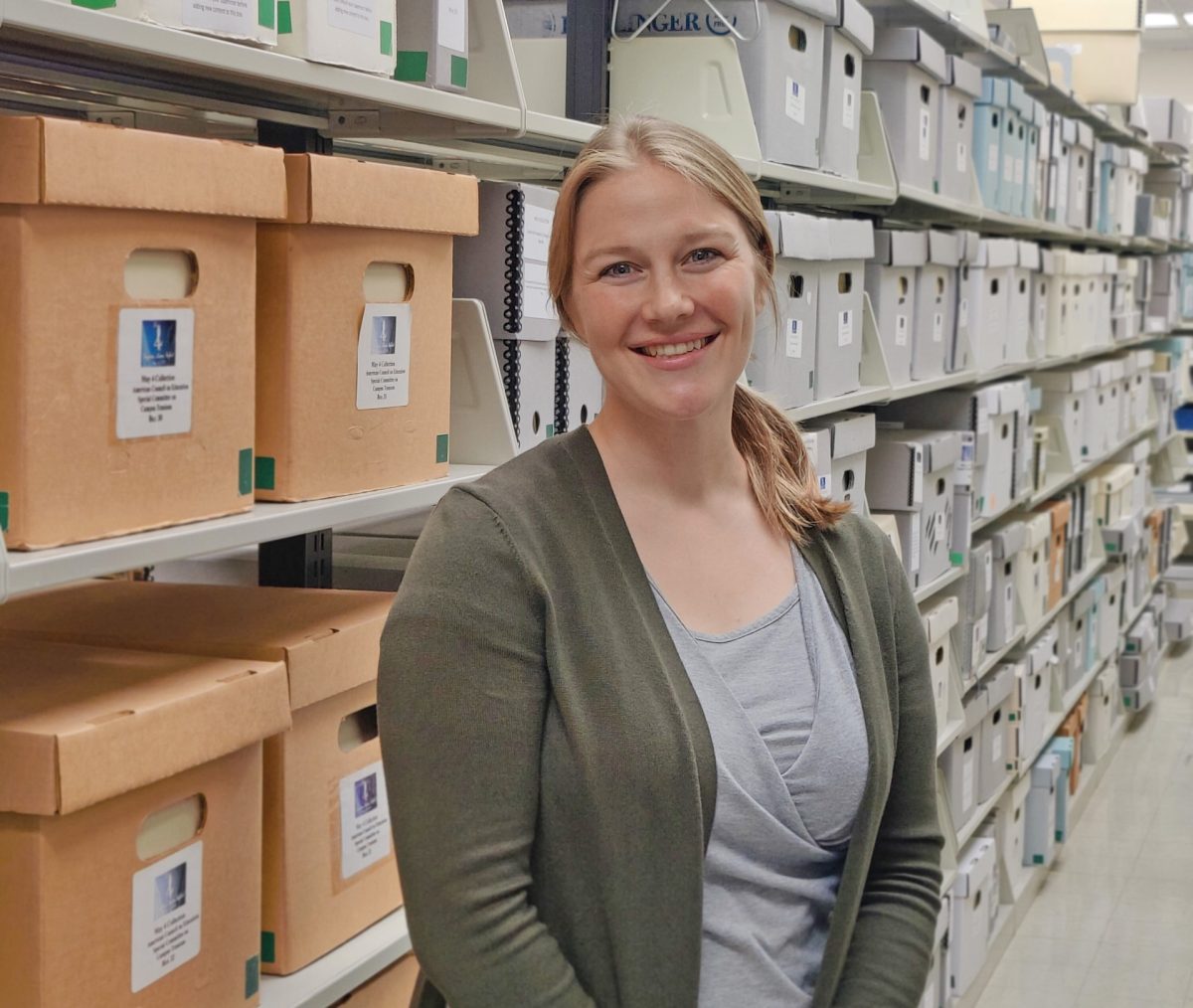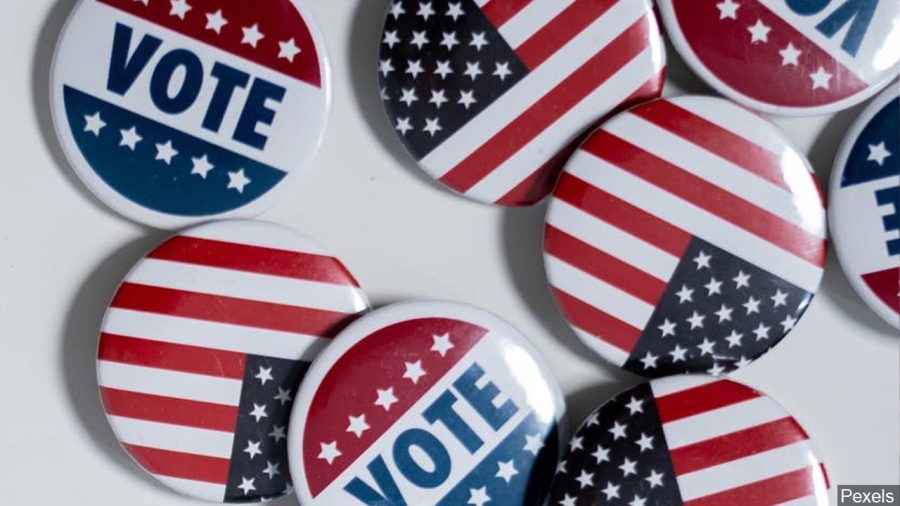Every work day, university archivist Kristin Silvestro sits in a room lined with shelves full of history stored on the top of the tallest building in the county.
In her new role, the Akron-area native will primarily handle the preservation of university history specifically, along with working with May 4 materials, managing records and preserving permanent files.
She said keeping archives benefits the university community.
“We want you to have access to the materials, to get to see them hands on and learn about the history that we’re preserving here, the special materials that we’re able to preserve and make accessible,” she said. “It’s really supposed to be about access, and making sure people are able to learn about the university, about the community, about the people and how things have changed over time.”
University Libraries announced Silvestro’s addition in early October. She said she first learned about archives as an undergraduate student at Wittenberg University in Springfield. She later earned master’s degrees in history and library and information science from Simmons University in Boston.
Her first job in university archives was at Northeastern University, where she worked up until deciding to return to Northeast Ohio.
“I fell in love with the people you get to work with,” Silvestro said. “I fell in love working with alumni trying to find things from their time there or family members trying to find things about the family members who went there, students getting to experience that feeling I had for the first time. I loved when classes came in, and I got to see someone have that spark of like, ‘Oh, this is cool. This is something I’m allowed to come back to and use.’”
Before coming back to Ohio, Silvestro also worked with archives at the John F. Kennedy Presidential Library archives and Boston’s Children’s Hospital. She then became a corporate and philanthropic history archivist for the Western Reserve Historical Society in Cleveland.
Kent State already had a place in Silvestro’s life before she came to the university, she said. Silvestro’s parents met at and graduated from KSU, and one of her three sisters also graduated from the university.
The archival process and working with history
People cannot check out Special Collections and Archives materials from the library. Instead, they can make an appointment to see original archives in person in the reading room on the 12th floor of the library, or people can request copies or scans of materials for a small fee.
After someone makes an appointment to see materials – at least 48 hours in advance – a staff member will retrieve the needed archives for them to look at in the reading room. Food and drink are not allowed in the room, and bags and coats must be kept in a designated area, according to the University Libraries’ guidelines.
Silvestro said she hopes to eliminate any hesitations people may have about accessing the archives.
“There’s often a perception that we get put in attics or basements and we’re kind of closed off or not accessible – and what I like to remind people of usually is: The reason there’s security is because we’re trying to make it accessible for as long as possible to as many people as possible,” she said. “These are really unique materials, so you’re not going to find them on every library shelf across public libraries and other universities.”
Potential archival materials, such as photographs and paper documents, must reach certain criteria for preservation to be kept by the university. Silvestro said the department stresses the importance of obtaining original copies of materials and looking for historical context for those materials, such as names and specific details for photographs.
Silvestro said the big pieces of the archivist job are processing, or organizing materials and putting them into layers of preservation, and appraisal, where a person goes through materials and sees what should be kept and removed from collections.
The job also involves working with researchers, other departments, students, classes and anyone else who wants to visit the archives.
“There’s a lot to do, it’s fun,” she said. “Every day really can kind of be different.”
Outreach is another big piece of her job, Silvestro said. This involves figuring out where gaps in history remain within collections and finding materials to add more context to years and topics.
“There’s ways that you can integrate the archives into a lot of different interests, because we have so much material related to so many different topics and people in groups,” she said. “We want to keep that diversity. We want to increase that diversity as much as possible because we also realized that we don’t have a lot of materials from certain groups and people that we would love to make sure we’re representing in our collections as well.”
Silvestro said the archives are not just for researchers or people working on projects. People can come by to learn about what life was like decades ago, like what people wore or were interested in.
The process of analyzing archival materials also teaches people how to read a primary source and look for bias, she said.
“Another really big benefit of working with archives and visiting the archives is learning how to work with these sources and how to critically look at materials that you are reading or seeing,” she said. “It’s not just taking everything at face value because you have to dig through boxes and folders and to get a full story.”
Digital thoughts
Digital does not mean permanent, and digital does not mean archived, Silvestro emphasized. While the archival department will continue to add the the thousands of digitized materials in its collection, she said digitally archiving history creates a lot more issues in terms of long term preservation.
Silvestro noted the high cost and time it takes to digitally archive materials. She said paper materials will most likely outlast digital archives due to bit loss, which can cause data to lose quality due to corruption.
“People don’t really think about the fact that all of your digital files really are in a very volatile state,” Silvestro said. “We think once it’s digital, we’re gonna have it forever, but it doesn’t actually mean that. That’s why archives really have this role right now, and we’re trying to figure out the digital side of it.”
A focus on the students
Silvestro said the archival group would like to gather information and documents from student groups on campus about what they’re doing and what they care about, in addition to other information.
She said she would like to start working with interested student groups to help them understand the archival process and decide what they would like to preserve. Interested student groups can email the Special Collections and Archives department at [email protected] or call 330-672-2270.
“[Student] stories are what makes this community what it is, and I feel like sometimes, in all my experiences with university archives, sometimes it gets lost,” she said. “That’s what people want to come back and see what was special or unique, and especially getting the diversity of the campus – making sure those stories are preserved in the archives is really important.”
Isabella Schreck is editor-in-chief. Contact her at [email protected].








